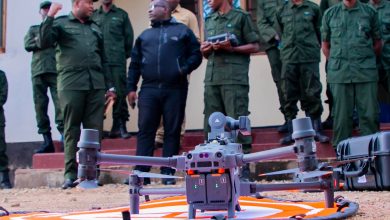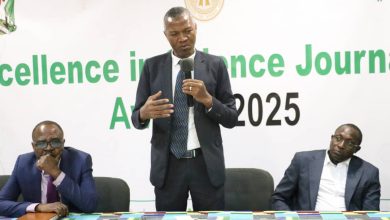How ICT can simplify mathematics learning in schools

DAR ES SALAAM: INTEGRATING Information and Communication Technology (ICT) into teaching challenging topics in Mathematics, Science and Life Skills has been highlighted as one of the most effective strategies to enhance students’ performance in these subjects.
Many students across the world, particularly in primary schools, often view Mathematics and Science as difficult subjects, leading to unsatisfactory performance.
However, thanks to innovative educational projects, this issue may soon be alleviated. The introduction of modules that incorporate ICT into the teaching of difficult topics in these subjects is a game-changer for primary education, offering new possibilities for both teachers and students.
A team of education experts from Tanzania, Kenya and South Sudan recently gathered in Dar es Salaam to discuss how to develop and implement these ICTintegrated modules effectively.
This effort is part of a larger initiative, funded by the International Development Research Centre (IDRC), under the theme “Strengthening Teacher Professional Development and Mentorship in Tanzania, Kenya and South Sudan.”
The project aims to address the challenges faced by teachers in teaching complex topics and help students better understand and perform in these essential subjects.
ALSO READ: Teachers stress importance of Mathematics in digital age
The four-day workshop was inaugurated by Dar es Salaam University College of Education (DUCE) Director of Research and Innovation Prof Amani Lusekelo, on behalf of the Deputy Principal for Academic, Research and Consultancy Dr Christina Raphael.
In his opening speech, Prof Lusekelo emphasised the importance of collaborative workshops like this one, where knowledge is shared and educators work together to improve the educational landscape in their respective countries.
He acknowledged that there is often a mismatch between the needs of society and what is delivered in the education sector, particularly in primary schools.
Equally, he expressed optimism that the modules being developed would significantly improve the teaching of Science, Technology, Engineering and Mathematics (STEM) subjects, which are crucial for the development of any nation.
Elaborating, Prof Lusekelo called for continued collaboration and expansion of the project to reach primary schools in remote areas, where access to quality educational resources and training is often limited.
He stressed that the implementation of these modules would be an essential step toward achieving the government’s goal of providing quality education to all children, regardless of location.
Commenting, Dr Katherine Fulgence, the Principal Investigator (PI) of the project, highlighted that the initiative is working closely with tutors from Teacher Training Colleges across the three countries. A total of 21 Teacher Training Colleges have been selected, with seven from each country.
These tutors will play a pivotal role in training primary school teachers and providing ongoing mentorship and support. In addition to focusing on difficult topics in Mathematics, Science and Life Skills, the project also integrates themes of Gender, Equity and Social Inclusion.
Dr Fulgence explained that one of the primary goals of the project is to alleviate the challenges faced by teachers in teaching subjects that are often seen as difficult, both for students and for teachers themselves.
Some topics in Mathematics and Science are so challenging that even teachers struggle to teach them effectively, which compounds the difficulty for students trying to learn these concepts.
The aim of the ICT-integrated modules is to simplify the teaching and learning process, making complex topics more accessible to both teachers and students.
The collaboration between Tanzania, Kenya and South Sudan was initiated because the challenges faced by these countries in the education sector are strikingly similar.
This commonality has made it easier for the three nations to work together to find solutions.
Dr Fulgence expressed confidence that the project, once fully implemented, would lead to significant improvements in the quality of education, especially in STEM subjects.
Prof Julius Maiyo from Kibabii University in Kenya emphasised the importance of these ICT-integrated modules.
He highlighted that many students struggle with Mathematics and Science and their poor performance is often due to the difficulty of the subjects themselves.
The project is not only focused on creating better teaching materials but also on building teachers’ capacity and providing them with the skills necessary to teach these subjects effectively.
Prof Maiyo shared that, through a baseline survey, both teachers and students had identified several difficult topics in Mathematics, such as Geometry, Algebra and Measurement, as well as in Science, including Classification, Reproduction, Atoms, Force and Energy.
In Life Skills, the project addresses areas such as Personal Skills, Social Skills, Digital Skills, Entrepreneurship and Health and Environmental Skills.
He further explained that Life Skills are an integral part of the project, recognising the importance of equipping students with the necessary skills to succeed in life, beyond just academic knowledge.
These skills are critical in the modern world, where communication, digital literacy and entrepreneurship are key factors in personal and professional development.
Associate Professor of Mathematics at the University of Juba Dr Paride Oresto, also emphasised the importance of designing user-friendly teaching modules.
He stressed that the workshop provided an excellent opportunity for educators to share ideas and collaborate on creating materials that will make teaching and learning more effective.
Dr Oresto noted that one of the major challenges in South Sudan is the lack of teacher motivation.
Despite the country having many qualified teachers, many leave the profession in search of better-paying jobs.
He argued that empowering and motivating teachers is crucial to improving the education system.
Dr Oresto called on governments to offer better incentives and support to teachers to ensure they remain in the profession and continue to make a positive impact in classrooms.
One of the participants, Patrick Sitta from Tabora Teachers’ College in Tanzania, spoke about the vital role ICT plays in modern education.
He emphasised that, in today’s digital world, there is no excuse for ignoring technology in education.
Patrick acknowledged that many topics in science are difficult to teach and that integrating ICT into these subjects would bridge the gap and make the learning process more engaging and accessible for students





